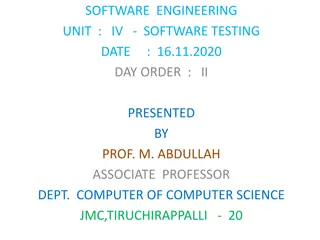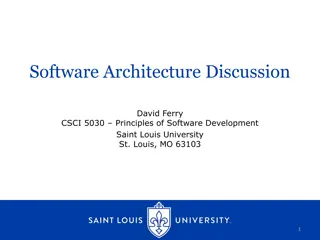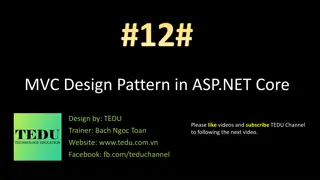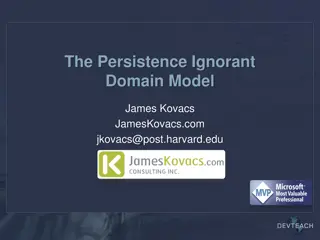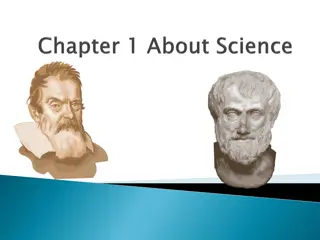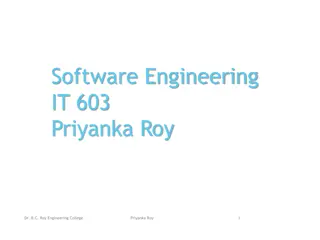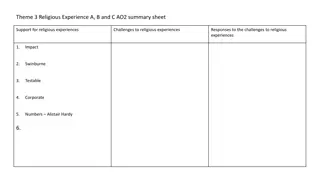Understanding Design Tactics and Quality Attributes
Quality attributes play a crucial role in system design by indicating how well a system meets stakeholder needs. Architecturally Significant Requirements (ASRs) have a profound impact on system architecture. Quality attributes can be operational (availability, reliability) or developmental (modifiab
2 views • 28 slides
Software Testing Fundamentals - Objectives, Principles, and Testability
Testing in software engineering is a critical process that aims to uncover errors in a program. This article discusses the objectives of testing, principles guiding effective test case design, and the importance of testability in software systems. Key points include the significance of traceability
2 views • 28 slides
Understanding Dependency Injection Principles in Software Development
Explore the concept of Dependency Injection, its importance in decoupling code modules, SOLID principles, and why it's crucial for maintainability, flexibility, and testability in software development.
0 views • 23 slides
Understanding Software Testing Fundamentals and Principles
Software testing is a crucial aspect of the software engineering process, aimed at identifying errors and ensuring the quality of the final product. This chapter delves into testing objectives, principles, testability considerations, white-box testing, and the importance of thorough testing methodol
0 views • 30 slides
Understanding Agile User Stories in Software Development
Agile user stories play a crucial role in software development by providing short descriptions of features desired by customers in a language they understand. This method allows for agile planning, efficient documentation, and effective communication between development teams and clients. Extracting
0 views • 30 slides
Examining the Intersection of Software Architecture and Agile Philosophy
Explore the potential conflicts and synergies between software architecture and agile philosophy, addressing concerns such as the devaluation of architectural efforts, balancing development speed with technical debt, and the complementary roles of agile principles and architectural practices in prom
0 views • 14 slides
Solutions to Minimize Polarization Basis Mismatch Impact in RF Testing
In the 3GPP TSG-RAN-WG4 Meeting #97-e, discussions focused on minimizing the impact of polarization basis mismatch between the TE and DUT in RF testing for Samsung devices. Various proposals were presented relating to EIRP measurement and methods to enhance testing procedures. Key topics included TP
0 views • 10 slides
Understand MVC Design Pattern in ASP.NET Core
ASP.NET Core web applications follow the MVC design pattern, which emphasizes separation of concerns, with distinct responsibilities for the Model, View, and Controller components. This pattern ensures maintainability, testability, and extensibility of applications. Learn how each component function
0 views • 8 slides
Understanding Persistence Ignorance in Domain Models
Persistence Ignorance is a concept in software development where domain models do not contain any persistence-related code, focusing solely on business logic. This approach promotes separation of concerns, single responsibility, loose coupling, testability, and reusability. NHibernate and Plain Old
0 views • 8 slides
Evolution of Scientific Thought and the Scientific Method
Explore the evolution of scientific theories and methodologies through the works of influential figures like Aristotle, Copernicus, Galileo Galilei, and Francis Bacon. From the geocentric beliefs of Aristotle to the heliocentric model proposed by Copernicus, witness the shift in paradigms and the em
0 views • 14 slides
Understanding Software Engineering Principles and Process Models
Software engineering involves managing complexity to create efficient software using sound engineering principles. It encompasses the systematic development, operation, and maintenance of software. Various process models guide software development stages, focusing on reliability, portability, effici
0 views • 41 slides
Understanding Religious Experiences: Support and Challenges
This content delves into religious experiences, offering support from scholars like Hume and Swinburne and presenting examples such as St. Teresa of Avila. It explores the impact, Swinburne's perspective, testability, and more, while also addressing challenges and responses. Additionally, it highlig
0 views • 15 slides
Understanding Functional Programming with Higher-order Functions
Functional programming emphasizes the use of pure functions and higher-order functions to achieve benefits such as predictability, testability, and parallelization. By focusing on avoiding side effects and emphasizing function purity, developers can create more maintainable and scalable code. Learn
0 views • 37 slides
Understanding Developmental Psychopathology: Models, Theories, and Perspectives
This content delves into the field of developmental psychopathology, exploring the use of models and theories in understanding maladaptive behaviors. It emphasizes the importance of considering developmental processes and normative behaviors, evaluating theories based on comprehensiveness, parsimony
1 views • 45 slides

